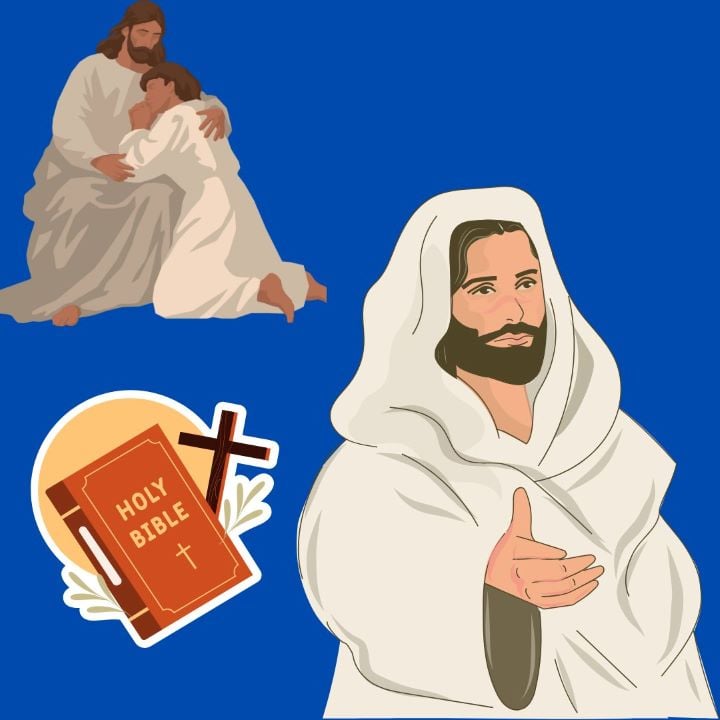This is my third essay exploring the meaning of “greatness.” My gut tells me President Trump is not making America great by dismantling government agencies and proposing to take over Gaza. I thought I would use some more reliable sources than my gut, however, and have considered greatness as defined by Alfred Nobel for the Peace Prize. Then I looked at the Old Testament. This essay explores the New Testament, with a focus on the Gospels.
Jesus made the following statement that I think sums up his perspective on greatness: “ … for what is prized by human beings is an abomination in the sight of God.” (Luke 16:15, NRSVCE)
Jesus Modeled Greatness
God the Father affirms his son in the Gospels. The Annunciation and Transfiguration are two such occasions.

“The angel said to her, ‘Do not be afraid, Mary, for you have found favor with God. And now, you will conceive in your womb and bear a son, and you will name him Jesus. He will be great, and will be called the Son of the Most High, and the Lord God will give to him the throne of his ancestor David.’” (Luke 1:30-32) God affirms Jesus during the Transfiguration. ” … suddenly a bright cloud overshadowed them, and from the cloud a voice said, ‘This is my Son, the Beloved; with him I am well pleased; listen to him!’” (Matthew 17:5) God the Father affirms his Son when Jesus is baptized. (Luke 3:21-22)
In John’s Gospel, Jesus asks that his apostles follow his example.”‘ For I have set you an example, that you also should do as I have done to you. Very truly, I tell you, servants are not greater than their master, nor are messengers greater than the one who sent them. If you know these things, you are blessed if you do them.'” (John 13:15-17)
Jesus’ Statements about Greatness
While the Gospel writers did not always use the term “great,” many of Jesus’ statements communicate the nature of greatness.
Greatness Means Trusting God Like a Child
The apostles grew to understand Jesus as time went on. When they were fighting among themselves about who was the greatest, Jesus ” … took a little child and put it by his side, and said to them, ‘Whoever welcomes this child in my name welcomes me, and whoever welcomes me welcomes the one who sent me; for the least among all of you is the greatest.’” (Luke 9:47-48)
Jesus refers to youth here too: “‘At that same hour Jesus rejoiced in the Holy Spirit and said, ‘I thank you, Father, Lord of heaven and earth, because you have hidden these things from the wise and the intelligent and have revealed them to infants; yes, Father, for such was your gracious will.'” (Matthew 11:25-26)
Helping Strangers is Great
In Luke 10:25-37, Jesus tells the story of the Good Samaritan in response to a question from a lawyer: “Who is my neighbor?” In this parable, Jesus pointedly says that the priest and Levite are not great because they ignore a beaten man on the side of the road. A Samaritan is the great neighbor because he cares for this man not just one day but pledges to pay an innkeeper to care for him until he comes back.
Forgiveness is an Element of Greatness
Jesus teaches his followers to pray and forgiveness is an important part of this prayer.
“‘Father, hallowed be your name.
Your kingdom come.
Give us each day our daily bread.
And forgive us our sins,
for we ourselves forgive everyone indebted to us.
And do not bring us to the time of trial.’”(Luke 11:2-4)
Giving Possessions to the Poor Makes One Great
Jesus does not mince words when it comes to wealth. He says, “‘Take care! Be on your guard against all kinds of greed; for one’s life does not consist in the abundance of possessions.’” (Luke 12: 15) Later, he says, “‘Sell your possessions, and give alms. Make purses for yourselves that do not wear out, an unfailing treasure in heaven, where no thief comes near and no moth destroys. For where your treasure is, there your heart will be also.'” (Luke 12:32) When a wealthy man asks Jesus what he must do to interit eternal life, he answers, “‘Sell all that you own and distribute the money to the poor, and you will have treasure in heaven; then come, follow me.’” (Luke 18:22) Lastly,
“Then Jesus said to his disciples, ‘Truly I tell you, it will be hard for a rich person to enter the kingdom of heaven. Again I tell you, it is easier for a camel to go through the eye of a needle than for someone who is rich to enter the kingdom of God.’ When the disciples heard this, they were greatly astounded and said, ‘Then who can be saved?’ But Jesus looked at them and said, ‘For mortals it is impossible, but for God all things are possible.'” (Matt 19: 23-26)
The “Blessed” and the Sheep and Goats
In two passages, Jesus shares the characteristics of those who are blessed and those who will go to heaven.
The Beatitudes
In Matthew 5, Jesus describes the people who are blessed. Some of these people are in tough situations. Interestingly, some of these situations are temporary (mourning) while others are personal qualities (merciful and have pure hearts.) He says that those who are poor in spirit will inherit the kingdom of heaven. (People still discuss what exactly “poor in spirit” means.)
People who mourn, are meek, who hunger and thirst for righteousness, are merciful, have pure hearts, are peacemakers, and are persecuted will be rewarded. Those who are treated badly by others because they follow Jesus will go to heaven.
The Sheep and Goats
Jesus is clear about who will have eternal life and who will not. The “sheep” will have eternal life while the “goats” will suffer eternally. Those who will go to heaven are people who give hungry and thirsty people food and drink; welcome strangers; provide clothing for people who need it; take care of people who are sick; and visit people in prison. Jesus says that doing this for other people is doing this for him. (Matthew 25:31-46)
Donald Trump and Greatness
While I do not know what the president plans for the future, it seems that he is not trying to use his power the way that Jesus did. Jesus wants his followers to use their power to build people up. Donald Trump is currently tearing things down, indiscriminately it seems. USAID, for example, helped hungry and sick people as well as those who need clothes and other material things for survival. Jesus also welcomed strangers while Trump is deporting them.
I am unsure whether Trump trusts anyone like a child which makes it difficult to trust God. The president has shown a disregard for people who have any type of weakness. Would he stop and help a beaten man like the Samaritan did? To date, revenge better describes the president’s attitude towards those who he feels wronged him rather than forgiveness.
Donald Trump’s “America First” idea and his freeze on foreign aid suggests that the United States may not help others in the future the way the country has in the past. People are expressing their dissatisfaction with him.
The talk of cutting programs that help poor and vulnerable people is concerning. I hope for the best but am unsure about the future. I do not think Trump’s early decisions suggest that he is using the Gospels as a criteria for greatness.













